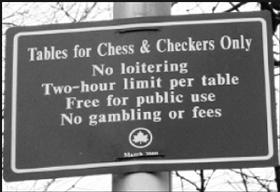By Lincoln Anderson
Police reportedly weren’t playing any games with alleged loiterers hanging out around the Washington Square Park chess tables one day last week — telling them they had to play chess or checkers or beat it.
On Mon., March 3, two witnesses separately called The Villager to say they were troubled after observing police order individuals to leave the area. According to both witnesses, the officers took a hard line on those they considered to be dawdling around the tables for no good reason.
Signs are posted high up on nearby light poles, saying “Tables for Chess & Checkers Only.” The signs also state loitering and gambling on games are not allowed and that there is a two-hour limit on the tables’ use.
Jeremy Bales, 30, a freelance photographer, was out in the park that day about 2:30 p.m., taking shots of people in the unseasonably warm weather. Bales said a pair of police officers — a man and a woman — pulled into the area in their car and started moving people along. Bales said one man muttered that the female officer told him he couldn’t sit waiting for a game, even though he had his own chess pieces and timer out.
“I saw them writing a guy a ticket,” Bales said. “I just saw them pointing to the signs.” He said the man had “funky clothes and a beard.”
Bales said two other men who appeared to be playing a game of chess with a timer, once the police left, whipped out bag lunches and started eating at their table. Meanwhile, the other player who the officers had shooed off returned and found a partner for a game. Bales said he actually wasn’t sure whether the officers had written the man a ticket or not, since he didn’t see the action clearly.
Sharon Woolums, an Eighth St. resident and an outspoken opponent of the Washington Square Park renovation project, had called The Villager earlier the same day, saying she was troubled after seeing a female police officer telling a man who was standing in the area to leave.
“He said, ‘Loitering? It’s my constitutional right to be in a park. Hanging out in a park is not loitering,’” Woolums said. “I agreed, and I asked what was going on. Later I found out what was going on was that this guy was sitting with another guy eating lunch at a chess table; there was one other chess player and nobody else at any of the 11 other chess tables.”
Woolums said at one point the man asked the police officer, “What law supersedes — this sign or my constitutional rights?” It looked like the female officer was about to give the man a ticket before Woolums intervened.
“I told them I was a community board public member and I would take it up at the community board,” Woolums said. “They took his name down — so he knew he had a warning — and next time they would give him a ticket. He said he had gotten one before.
“This is an erosion of our civil rights,” Woolums said. “You can’t stand around hanging out in a park? To even have a sign up there saying, ‘No Loitering.’ Good grief.”
Woolums said the man told her he grew up in the Village and always uses the park.
“He looked a little on the edge,” she said. “But, I mean, who’s going to be the decider? The police said there are drug dealers in the park. So, I said fine, arrest the drug dealers.”
Cristina De Luca, a Parks Department spokesperson, referred questions to the police.
Jimmy Alberici, Sixth Precinct community affairs officer, said he hadn’t heard about the incidents.
“They’re allowed to eat lunch there,” he said. It’s also O.K., he said, for someone to sit at a table if he or she is waiting for someone to play chess with.
As for why the police acted how they did, Alberici said he could only speculate.
“Sometimes if they make an arrest there, they send cops in for the rest of the day,” he noted. And certain individuals might have histories with certain officers, having been slapped with violations before, he added. Also, Alberici noted, the way individual police patrol “goes by the cop,” meaning different officers might approach situations differently.
Alberici stressed, though, that “there’s no new policy” governing the chess tables. On the other hand, he added, “We’ve been getting a lot of complaints in that area because the park’s closed [for the renovation]. I guess guys are on the side streets peddling marijuana.”
Although one might not always see uniformed officers around the chess tables, that doesn’t mean police aren’t on the beat.
“There’s a lot of plainclothes activity over there,” Alberici said.
The day after the two officers’ anti-loitering crackdown, other officers were observed passing through the area, but not taking any enforcement action: Around 12:30 p.m. on Tues., March 4, a police car was seen driving into the chess plaza, where people were eating at three of the tables. The car turned around and drove out without police having told anyone to stop eating.
About an hour later the same day, another police car pulled up by the chess tables. About six men were hanging out, plus a few chess players at the tables. It started to pour. Everyone left.





































